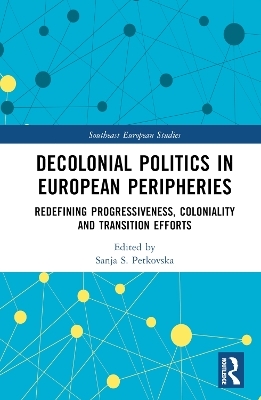
Decolonial Politics in European Peripheries
Routledge (Verlag)
978-1-032-16035-1 (ISBN)
Decolonial Politics in European Peripheries: Redefining Progressiveness, Coloniality and Transition Efforts is a timely contribution to the project of theorizing “Europe” through decolonial perspectives on the Left, as the European and global crisis has prompted new reflections on what it means to sit still at the European “peripheries”.
The book explores how the joint scholarship efforts of postcolonial and postsocialist scholars might come up with better-grounded and more detailed theoretical and methodological insights into the process of globalization, and subsequent peripheralization, if framed under a progressive and leftist perspective. The authors, many from the South-East Europe region, use a variety of analytical lenses to demonstrate how the nexus of postcolonial, postsocialist area studies and progressive developmental political thought could inspire changes in the future which are in dissonance with neoliberal and neoconservative capitalism. As the side effects of global capitalism continue to accelerate, scholars and activists in the postsocialist periphery are increasingly turning to the concept of decoloniality in the hope that it might offer more options on how to begin to build up their framework. This book offers numerous examples of how decolonial theory can be applied to activist work in the fight against austerity and neoliberalization, as well as examples of how decolonial critique can be mobilized to contest processes of Europeanization and Euro-Atlantic integration.
This book will intrigue students and scholars of critical social scholarship in general as well as postsocialism and postcolonialism, critiques of right populism and the rise of white nationalism in Europe, and those studying the regions of South-Eastern Europe and Eurasia more generally. It will also interest activists, organizers, decision-makers, policy analysts, and leftists, both in the region and internationally.
Sanja S. Petkovska obtained a PhD degree in Cultural Studies from the Faculty of Political Sciences at the University of Belgrade, Serbia, and previous academic degrees in Cultural Sociology and Adult Education from the Faculty of Philosophy at the same university. She works at the Institute of Criminological and Sociological Research in Belgrade, Serbia, as a Research Fellow and her research revolves around the domains of critical theory, human–animal relations, knowledge production, cultural studies, violence, and public policies.
Introduction Part I: Is There a Way Out of the Boomerang of Postsocialism? 1. Production of Knowledge, Class Struggle, and the Postsocialist Condition 2. Conceptualising the Inequalities in Knowledge Production and Drawing the Prospects for Postsocialist Studies Part II: Decolonising Perspectives on Migration and Leftist Politics and Policies 3. Care Extractivism in Migration Flows from Post-Socialist to Southern Europe and Care Municipalism as a Decolonizing Project 4. Post-socialist Migration from North Macedonia: The Case of “Work and Travel” Students in the USA. Is the American Dream Still Alive? 5. Neo-colonial Migration Policies, EU Resilience, and the Role of Greece: Critique and the Possibility of Alternatives 6. Decolonizing Forced Migration Studies: Notes from Borderlands Part III: Intersectional Decolonisation and a Struggle for Recognition and Empowerment 7. Beyond Multiculturalism: Minority Intellectuals in the Postsocialist Predicament of Southeast Europe 8. “Thank You For Not Attending”: The Relevance of the Issue of Socio-cultural Inequalities in the Process of Reforming Cultural Policy in Post-Milošević Serbia 9. “Slaves in Our Country”: Postcolonialism or Neo-Colonialism? Dynamics of Nationalism in Romania and the Rise of the Populist Right Part IV: Coming to Terms with the Nation(s) Again 10. Leadership Rent and Patronage in the EU Global Strategy Evolution 11. Conservative Use of Post-colonial Rhetotic: The Polish and Czech Cases 12. “Beautiful!!! And a Bit Scary”: The Visitors’ Comments at the Museum of the Macedonian Struggle in Skopje and the Reception of History and Memory Narratives in North Macedonia (2011–14) 13. From “Air War” to “Partnership for Peace”: NATO’s Relations with Serbia from the Left Perspective Part V: Rethinking the Transition Model and Imagining the Different Future Politics of the Former Socialist Countries 14. No Escape from Coloniality? Comparing Geopolitical (Self)imagination in the Former Soviet Periphery 15. A Colonial Expedition in the Balkans: Ethnography as Primitive Accumulation During the First World War 16. Colonies in Interwar Europe? The Balkan Communist Parties as Precursors of Anti-Colonialism
| Erscheinungsdatum | 14.12.2023 |
|---|---|
| Reihe/Serie | Southeast European Studies |
| Zusatzinfo | 7 Halftones, black and white; 7 Illustrations, black and white |
| Verlagsort | London |
| Sprache | englisch |
| Maße | 156 x 234 mm |
| Gewicht | 560 g |
| Themenwelt | Geschichte ► Teilgebiete der Geschichte ► Wirtschaftsgeschichte |
| Geisteswissenschaften ► Philosophie | |
| Wirtschaft ► Volkswirtschaftslehre ► Wirtschaftspolitik | |
| ISBN-10 | 1-032-16035-7 / 1032160357 |
| ISBN-13 | 978-1-032-16035-1 / 9781032160351 |
| Zustand | Neuware |
| Haben Sie eine Frage zum Produkt? |
aus dem Bereich


